Who Was the Last Know-It-All? Considering Kircher, Goethe, Humboldt, and Young

In the modern world, no living person can claim a full understanding of all human knowledge. Not even close. I have a hard time keeping up with what’s happening in just one day on the Internet. But in previous centuries, it was possible to be a complete polymath, at least theoretically. No one could know every language or culture in the world and its particular knowledge, but it was possible for someone to have gained a full knowledge of all significant intellectual material that was available to him or her in that time and place.
Until about 1750 or 1800 (when the Enlightenment and scientific inquiry led to more information than any one person could understand), a European intellectual with a “Renaissance man” interest in different fields could have read nearly every important book that had been printed, be fluent with the medical, astronomical, scientific and mathematical knowledge of the day, and have been exposed to the significant works of art, theater, and music. Throw in other fields such as history, geography, philosophy, political theory, religion, and law; that person would be very close to knowing everything there was to know in that era.
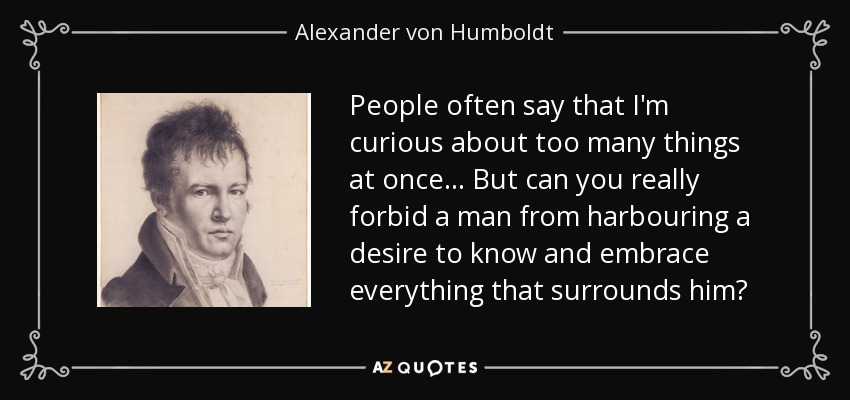
Granted, this exercise is patriarchal and it is Euro-centric. An eighteenth century European intellectual would not have known all of the legends of the Hopi tribe, the Chinese remedy for a sore throat, or how to say “Thank you” in the Zulu language. And it also restricts the list of candidates to those who led public intellectual lives or who published prolifically.
That rules out most women, who were not as well educated or accepted for their intellectual contributions until later. And it rules out most people from parts of the world outside of Europe. Is it possible that an aristocratic woman, with the time to self-educate herself, a large library at hand, a number of visits to major museums and theaters, and a circle of intelligent friends and family members, might have come close to obtaining that level of understanding? Could someone from Cambodia, Chile, Cuba, or Cameroon have done the same? Perhaps, but unless the person was known to others or published works that demonstrated a high level of knowledge, then we may never know.
“The last man to know everything” (or a similar phrase) is a subtitle of several biographies, each focusing on a different person. I will focus on the four I believe to be the best candidates to claim such a title. As mentioned, this may not be inclusive. Also, I’m sure that some people would include Aristotle, Leonardo da Vinci, and Shakespeare on their lists, but even if they were “know it alls” of their time, they lived too early. This post is about the LAST (most recent) person to have known all there was to know.
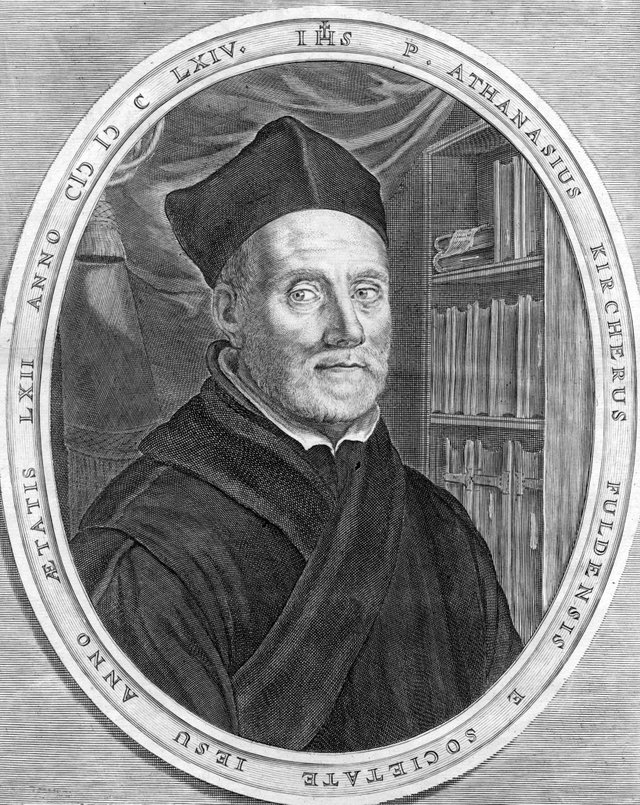
Athanasius Kircher (1602-1680)
Athanasius Kircher (or Kirchner) was a Jesuit scholar from Germany, who lived in the Seventeenth Century. He explored and pioneered scholarship in a number of different fields, including comparative religion, geology, biology, medicine, mathematics, languages, and Egyptology. Though some of his theories were later proven wrong, he probably had a more all-encompassing knowledge of science, medicine, history, and religion than anyone else of his era. He also had a keen understanding of technology, inventing the megaphone, various magnetic clocks, and automaton gadgets.
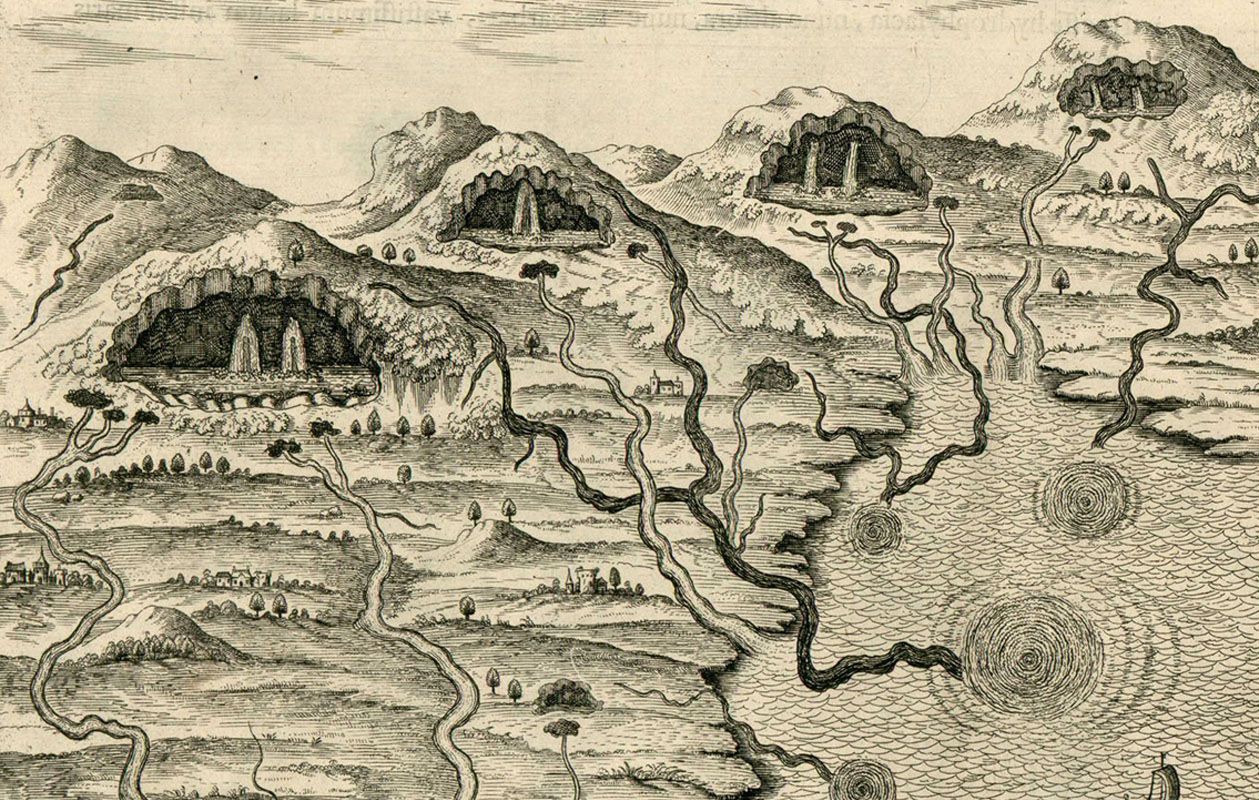
A drawing by Kircher, called Mundus Subterraneus.
Kircher taught several languages (in addition to physics, mathematics, religion, and other subjects), including Hebrew and Syriac/Aramaic. This led him to Egyptian hieroglyphics, for which he claimed to have cracked the code. It later turned out to be incorrect, but he made influential studies of ancient Egypt and its connection to other ancient cultures.
In a completely separate discipline, Kircher was one of the first people to conclude that the plague was caused by an organism. He used a microscope to view what he thought was the microorganism responsible (though today, it seems more likely he was viewing blood cells). Then he proposed quarantine procedures to keep the plague from spreading, a revolutionary idea in its own right.
Later scholars have called Kircher “the last Renaissance man” and “one of the last thinkers who could rightfully claim all knowledge as his domain.”
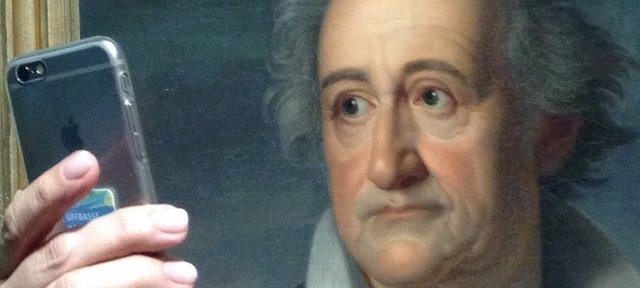
Johann Wolfgang von Goethe (1749-1832)
Albert Einstein believed that Johann Goethe was “the last man in the world to know everything.” By all accounts, Goethe was one of the most intelligent and intellectually varied human beings who has ever lived. Literature, poetry, drama, philosophy, linguistics, botany, chemistry, physics, anatomy, government, law: Goethe’s wide range of interests made him a force in many fields. Tutored in languages and educated in law, he had an early interest in both drawing and literature.
He is probably best known for Faust, his epic drama that brought us the idea of selling one’s soul to the devil. Tremendously influential even today, his literary works became a cornerstone (many would say THE cornerstone) of Nineteenth century thought. In the field of music alone, Goethe’s works inspired pieces by Mozart, Beethoven, Schuman, Wagner, Berlioz, Liszt, Mahler, and others. So many later thinkers, from Hegel to Wittgenstein to Marx, drew heavily upon Goethe.
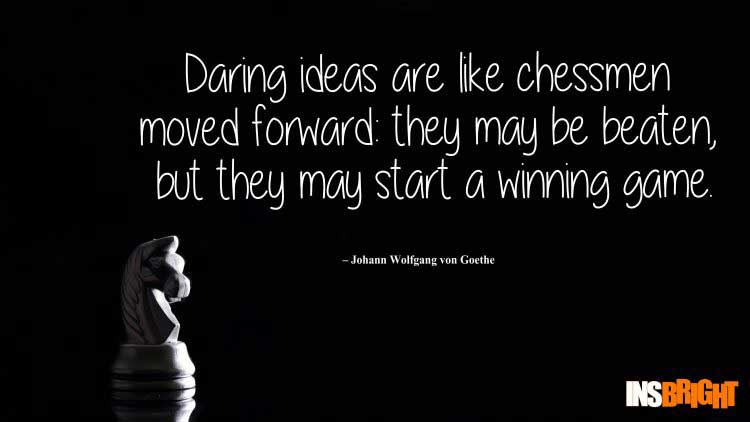
In science, Goethe believed his most important contribution was in the field of color, where he analyzed the spectrum of light. He owned the largest private collection of minerals in Europe and made studies that involved fossils. Beginning with the skull of an elephant, he discovered bone features which were common to all mammals, including humans.
He also was active with botany, in which he demonstrated his organic view of nature. This approach became quite important in the way that scientists (then and today) understand the natural world. Goethe focused more on the nature of processes, such as the metamorphosis of plants during the stages of their growth, rather than viewing each part in isolation as if it were arbitrary or externally determined.
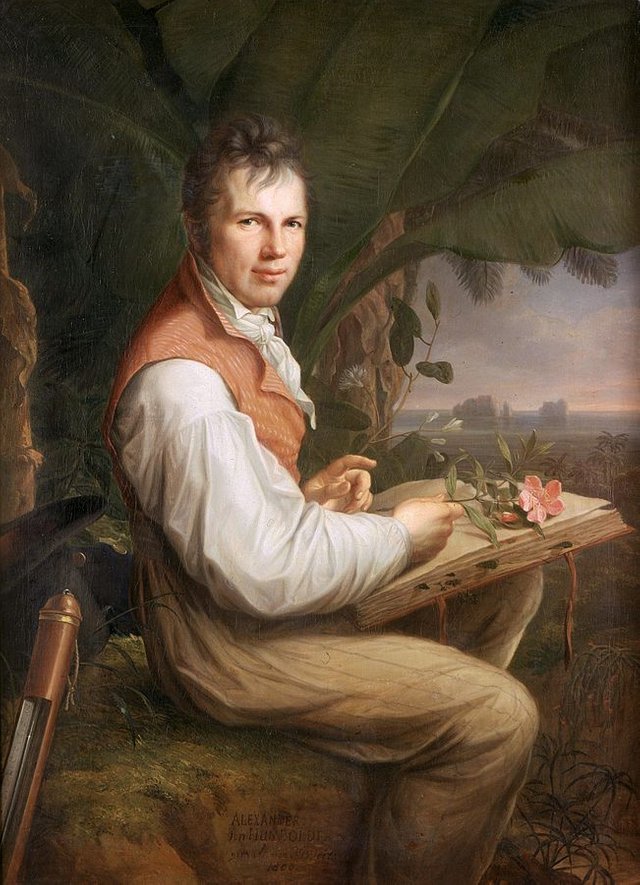
Alexander von Humboldt (1769-1859)
A contemporary and friend of Goethe, Humboldt was a Prussian scientist, naturalist, explorer, geographer, philosopher, and more. Beginning in 1799, he travelled extensively in Latin America, which he was the first to describe from a modern scientific perspective. He travelled in Venezuela, the Andes, Mexico, Cuba, and into the United States. Later in his life, he explored Russia into Central Asia as well. He was driven to explore and pushed his body to great extremes. He was one of the first to suggest that Africa and South America once fit together. Humboldt brought all aspects of nature together, describing it in terms of philosophy and science.
More places and species are named after Humboldt than any other person who has ever lived. Humboldt was one of the “wonders of the world,” according to Ralph Waldo Emerson. According to Charles Darwin, Humboldt was the “greatest scientific traveler who ever lived” and the reason that Darwin embarked on his own voyage of discovery. Thomas Jefferson called him “the most scientific man of his age.” Johann Goethe (also on this list) said spending a few days with Humboldt was like “having lived several years.” In Jules Verne’s 20,000 Leagues Under the Sea, Captain Nemo was described as owning Humboldt’s complete works.
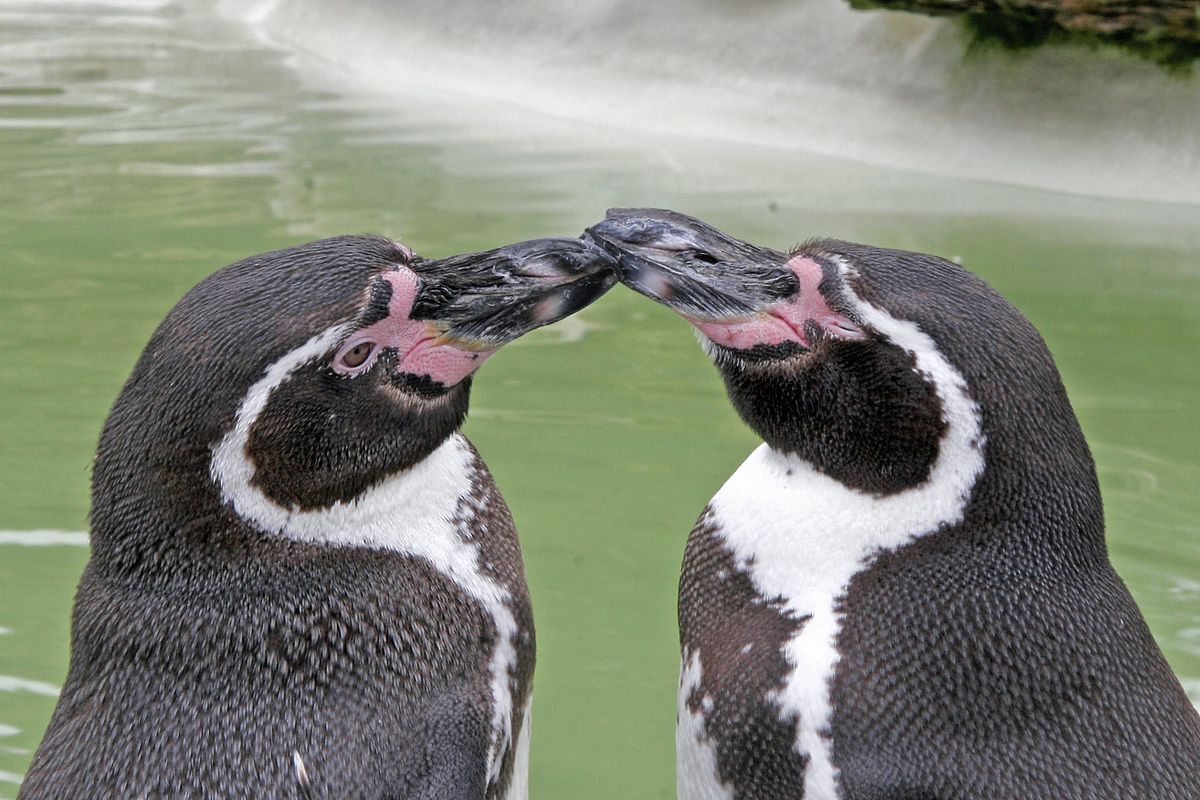
The Humboldt Penguin, one of many species bearing Alexander's name. Public Domain.
The Los Angeles Times explained his influence as follows: “When Humboldt died in 1859, aged 89, he was arguably the last great polymath, a man who investigated nature not just with scientific methods but also by looking at art, history, literature and economics. He searched for global patterns, and his most important insight was that nature is a web of life. At a time when scientists were classifying the world into ever smaller taxonomic units, Humboldt regarded Earth as one great living organism in which everything was connected.”
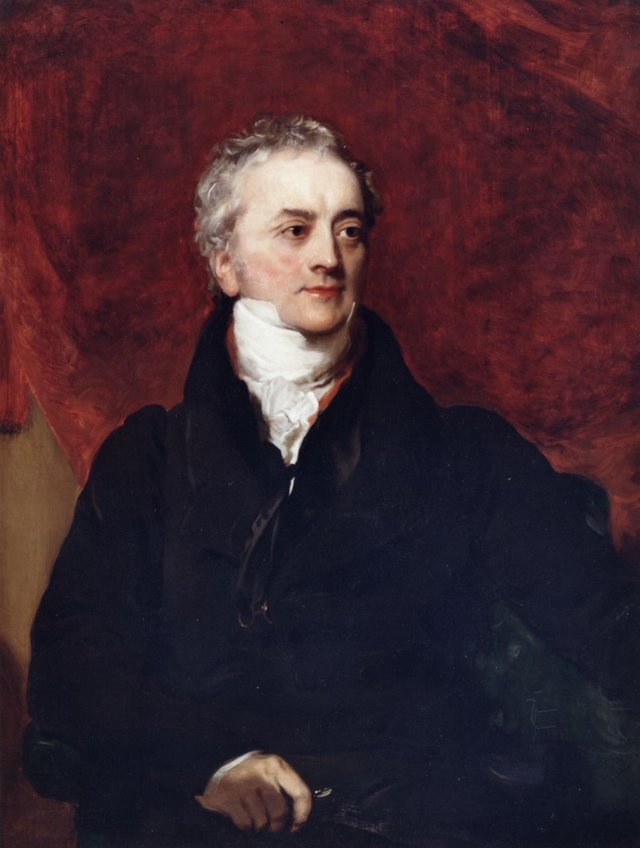
Thomas Young (1773-1829)
“The Last Man Who Knew Everything” was the title of a biography of the British physician, scientist, and linguist Thomas Young, who was born in 1773. Young was a child prodigy who became known as a walking encyclopedia. He continued learning and exploring throughout his life.
He was able to read at age 2, had read the Bible twice by age 4, and was reciting long works of poetry by age 6. By the time he was a teen, Young was reading in Greek, Latin, Hebrew, Persian, Syriac, and Chaldean. By 20, he also had learned French, German, Spanish, Arabic, and Italian. He taught himself calculus and began studying medicine, later working as a physician and being appointed as a professor of natural philosophy at the Royal Institution.
Young was the first person to coin the term “energy”. His most well-known achievement was his development of the wave theory of light, overcoming Isaac Newton’s view of light as a particle. He demonstrated this with experiments and published it. In physics, he also is known for his modulus of elasticity. He was the first one to describe optics in relation to human physiology. And he made a number of other original contributions in medicine.
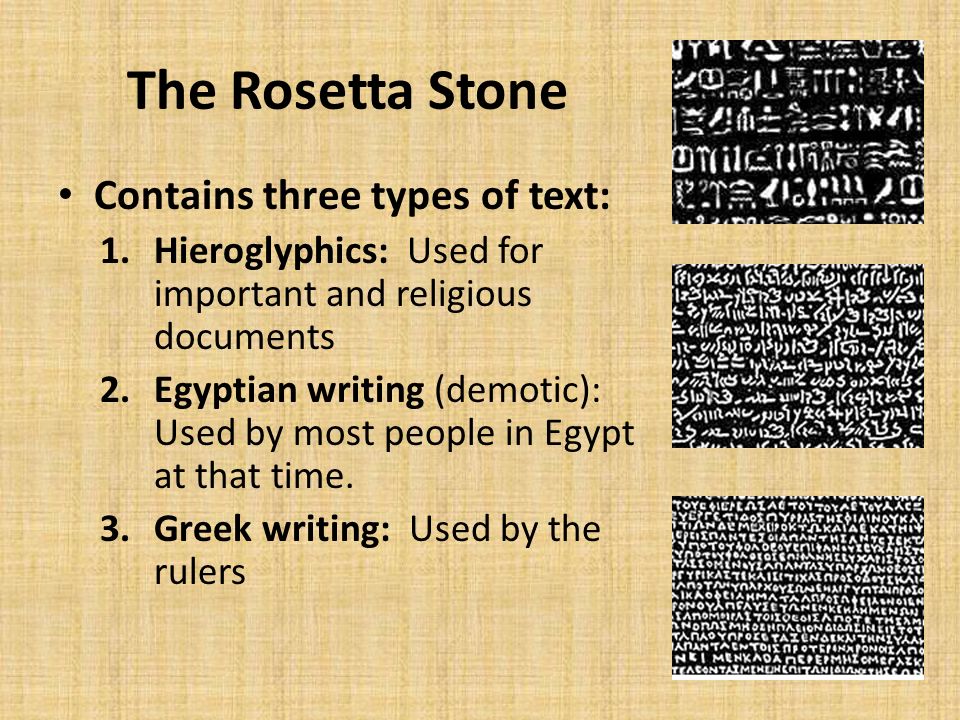
In linguistics, Young deciphered part of the Rosetta Stone, his work helping to provide a basis for the remainder of the translation by others. He discovered some characters that were a key to deciphering it, though he also made some false assumptions. Most importantly, Young deciphered the demotic script, concluding correctly that it contained both phonetic and ideographic elements.
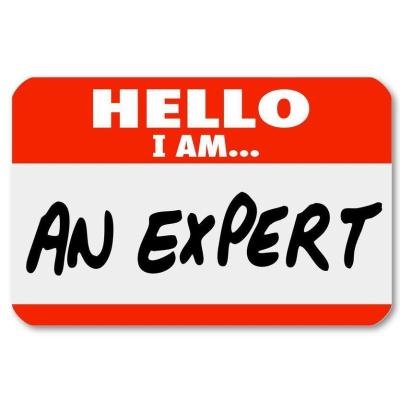
Conclusion
Perhaps they were all “know it alls”. But probably by 1850, if not well before, there was too much development in science, literature, and other fields for any one person to fully know everything there was to know. That's why there was this narrow window in time and place. One of these men (or perhaps someone who I didn’t list) probably was the last person to know everything. After that point, it could not be done. Heck, I can’t even get through a full post on Steemit sometimes!
Sources:
https://www.iep.utm.edu/goethe/
https://en.wikipedia.org/wiki/Johann_Wolfgang_von_Goethe
https://en.wikipedia.org/wiki/Goethe%27s_Faust
https://en.wikipedia.org/wiki/Athanasius_Kircher
http://www.newadvent.org/cathen/08661a.htm
http://www.latimes.com/opinion/op-ed/la-oe-wulf-rediscovering-alexander-von-humboldt-20150705-story.html
https://www.theatlantic.com/science/archive/2015/12/the-forgotten-father-of-environmentalism/421434/
https://en.wikipedia.org/wiki/Alexander_von_Humboldt
http://www.eoht.info/page/Thomas+Young
https://en.wikipedia.org/wiki/Thomas_Young_(scientist)
https://en.wikipedia.org/wiki/The_Last_Man_Who_Knew_Everything
Images are public domain or contain source links (for the quotes) unless otherwise indicated, except: Watson/Jeopardy (Creative Commons via Flickr.com by Atomic Taco) and Goethe Phone (Courtesy of goethe.de). Below: Humboldt in his library; painting by Eduard Hildebrandt (public domain).
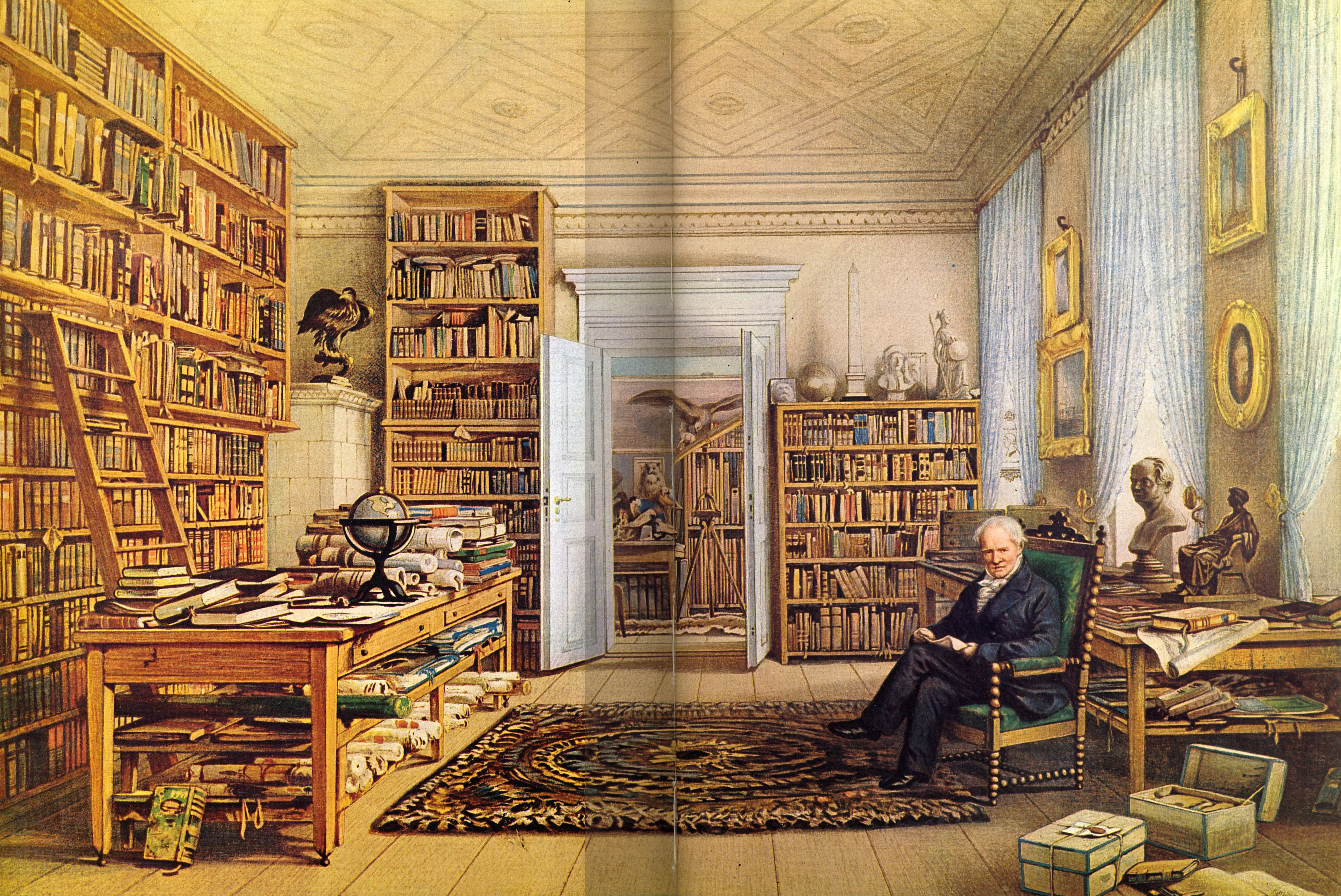
This is an interesting thing. I would like to be remembered for contributing positively to the world with my knowledge some day. Thank you for sharing.
This is an interesting read. These people (I choose to call them legends) did a lot of work studying wide, and making inventions, though we could call those inventions crude, I believe they are the bedrock of the modern technology we have today. They opened eyes of other people to possibilities and hence, wider research.
Though some of their theories were later proven wrong, they still held for some time and it was because there was a theory that people found out a better or more accurate one. Their works go a long way to affect our knowledge of science and technology, arts and languages and so on today. If we have no more know-it-alls today, I wonder what will happen in the nearest future as technology expands.
As we approach pico-technology, people will have to know more about a little so as to be relevant rather than knowing little about so much. I hope that makes sense.
Absolutely no one can claim he knows everything in this world. According to scientist, 86% still unknownin this world - 86 Percent of Earth's Species Still Unknown?. Mind you this is only the things that is under the sun, how about those beyond the sun, in the outer part of this world.
There is just so much to be discovered in this world and there's only a little the human brain can comprehend, but generation to generation, knowledge is expanding. A generation takes off from where the previous stops. Growing from macro knowledge to micro until we get to study the science of the tiniest particles and their application.
Yes, it makes sense. We've become quite reliant on being able to find information rather than remember it. Whether that's good or bad, I don't know.
I don't really think it's possible to know it all. There's no denying the wisdom and intellectual capabilities of these men, but knowledge has expanded and sgphifted so much since then it would have been a convoluted mess were it not for specialization.
Specialization exists everywhere- in nature and in education.
The same was group of body cells come together to achieve a tiny part of the full body functions is the same way the man of today can specialize and become a master in a field. Not all of them. I don't believe that.
I've always enjoyed your writing, I learn from it.
They did their own part to help sharpen the world, Newton Law of thermodynamics is still used today.
Modern scientist used that foundation which has been laid by these Know It All genius to further make their research more easily
The most important thing is that they were all thinkers and put their brain into good use. People nowadays tend to be dumb because they don't use their brainpower.
In my dreams I always wanted to be everything..A musician, writer,footballer,intellect,doctor,UN secretary general...the list longs.Also I wanted to be expert in atleast 50 languages!
It is estimated that an average human doesn't use his/her brain completely.If we were computers no computer ever can outpower us..But that argument is just theoretical! Limitations are overwhelming.
Out of all you have mentioned 'Thomas Young' fascinates me a lot..Reason being he is comparatively modern..Science and all had sprouted out by then.
But in today's world no one can ever become expert even in their on field.Ocean of knowledge floats on the air.But the era of becoming 'Expert of all' has gone forever!
Well @donkeypong inmust tell you that our educational system made us duller than we think. Back them people read and study what they loved. The studied what interests them and studying what prompts your curiosity goes a long way in making you understand that concept better than studying what you have been forced to study .
We had lots of geniuses back then too because many of them concentrated more on a particular field and gave it their very best. These days , a child who is interested in music would be chastised by his parents and asked to go study law. He goes to school and is uninterested . The part of him that loves music begins to dwindle yet he isn't putting in his best into learning law and he comes out a nobody because he has achieved nothing in life.
Same goes to a child who loved playing with gadgets . The potential of him becoming a gadget genius exists but no, his parents wants him to be a doctor and that's the end of his Tech ambition.
Our schools often force us to learn what we are so uninterested in learning . Wuth less enthusiasm, we go to school and come back just the same and at the end we just cram to pass exams.
I saw a video one day about a young lady who started drawing from when she was 2 years. Her parents wanted sending her to school but realised she was so uninterested in going to school and reading other books. The only books she loved reading were books related to art and drawings. She could read thousands of such books at her tender age but wouldn't read anything else and so her parents let her be. At the time of watching that video, she was only 13 and had started making millions for her parents with her drawings. She became the bread winner coz her drawings were just exquisite. She became an art genius simply because she did and studied what she enjoyed.
Same goes to this generation. If only we could be allowed to study exactly what we want to study , read only the books we want to read and learn only what we want to learn, you would be surprised at how fast your mind will accept information and make you a master of all just like these great minds above.
That raises the question of basic income. If, in a future dominated by robots, people were paid a fixed income and did not work for a living, perhaps art, music, and other pursuits would thrive in a new way. Or perhaps not. It's difficult to know.
Lovely post!All of them were the progenitors of modern science!Who does not know the history is useful to read..
Ideas are really like chessmen moving forward. They can be a game changer or simply could end up being a piece of trash. But if everyone starts resisting to put forward an idea because of the fear of it not working then world would be at a halt and there will be no modifications to our present world. So one should start putting forward an idea see whether it works or not. If it works it will be great for the cause and if doesn't still one should take a pride from it. Moreover being curious to know about the things is a gifts not everyone has. If you are curious to know many a things you are on the right side of the world. Although it may not be possible to know about all the things as the world is too vast to know about everythin. Yet one should try to know about different things from variety of topics as he/she may end up helping humanity in many ways which ofcourse is good for the society.
Well @donkeypong inmust disclose to you that our instructive framework madebus more blunt than we might suspect. Back them individuals read and study what they cherished. The contemplated what intrigues them and considering what prompts your interest giesba long route in improving you comprehend that idea than examining what you have been compelled to think about .
We had loads of masters in those days too on the grounds that a considerable lot of them focused more on a specific field and gave it their absolute best. Nowadays , a youngster who is occupied with music would be chastised by his folks and requested to go examine law. He goes to class and is uninterested . The piece of him that affections music starts to decrease yet he isn't putting in his best into learning law and he turns out no one important on the grounds that he has accomplished nothing throughout everyday life.
Yes, that's true. And most people need to work for a living also, which some aristocrats and intellectuals of the past did not.
Lsst person to know everything.... what i got from the web about them is that at least three, Thomas Young, Joseph Leidy, who built on Goethe's morphology work, and Athanasius Kircher, shown adjacent, have had books written about them, with the epitaph "the last man to know everything" attributed or affixed to their name.
Leidy was extremely smart and wide-ranging, but I think he lived too late to know everything. There was too much going on by the 19th Century.
i am sure about this, thank you for sharing them
The world today is too vast to be a know it all.
You are a genius if you know all about a particular field.
But there's just too much going on to know everything
There's no way to know it all now. Back then? Perhaps.
Perhaps.
Sometimes even steemit can feel overwhelming.
Knowing it all is out of the question now
Well knowledge is the key to everything, but the thing is knowledge doesn't matter that much if you don't implement it in your daily life, practical is important, if you possess a small knowledge but implement that in your life, it's far better than possessing infinite knowledge and not implementing it in your life, all of the above said people have done a lot for the society, humanity is this far due to them.
True. That reminds me of another quote...
Hmm.. It the thing, how much we implement in our life
It is really hard to claim you know everything in this current age where we have information overflow from all directions.
These guys were great as i can read and also the world had not yet developed to peak levels we are at now.
I am amused by how almost most of Athanasius Kircher's work was proven wrong,especially the part where he was viewing bloodcells 🙆🙆.
I have read some counts about how great Johann Wolfgang von Goethe was and am happy he is on the list.
The one who deserved to be on top is the on you put at the bottom hahaha!!
The walking encyclopedia Thomas Young,damn he was abke to read at 2 and had read the Bible twice by age 4..!!!!! I have not even reached half way the bible yet!
I do now accept this guy was a "know-it-all"
How can someone like me have or develop such abilities in this current age?
Yes, I did not list them in order of importance, only order of birth by date. Some people are very bright with languages and learning is easy for them.